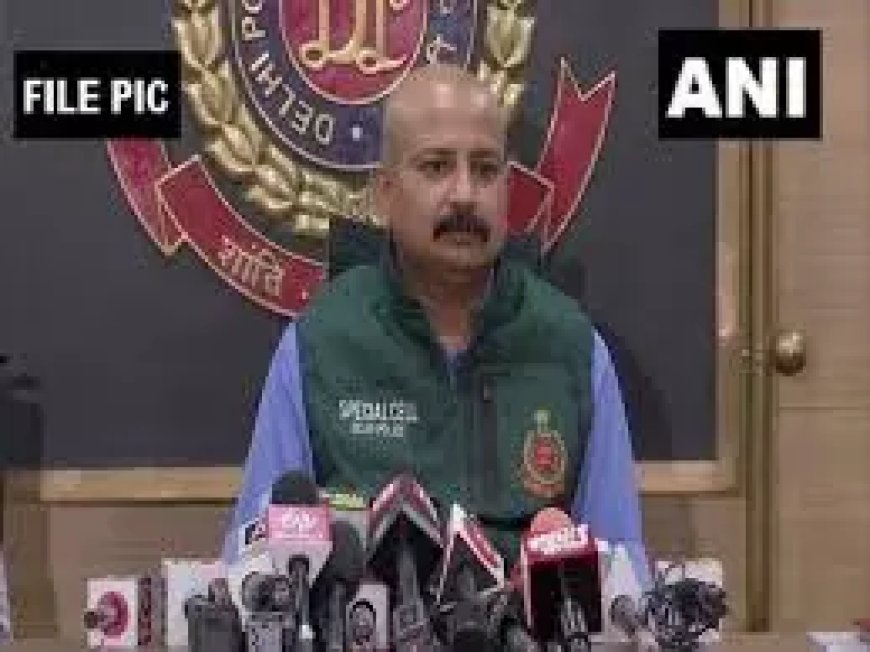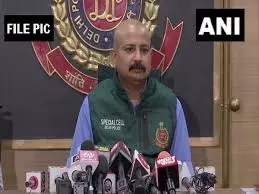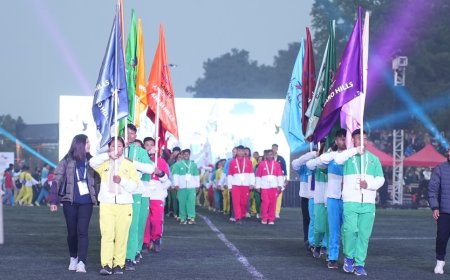Dilip Cherian | Transfer, cancel: Delhi top cop won’t let OSD go before elections
Even babu reshuffles seem to carry a whiff of drama when it comes to the political theatre surrounding the Delhi Assembly elections. The recent back-and-forth on IPS officer Manishi Chandra’s transfer is a case in point. Last month, the Union home ministry announced Mr Chandra’s transfer from his position as Officer on Special Duty (OSD) to the Delhi police commissioner to Mizoram. Fast forward two weeks, and a notification last week did a complete 180, cancelling the transfer “with immediate effect.” Officially, Mr Chandra stays put in Delhi for now. According to the grapevine, Delhi police commissioner Sanjay Arora wasn’t exactly thrilled about losing Mr Chandra during this critical pre-election period. Rumour has it that he stood his ground, refusing to relieve Mr Chandra for Mizoram, and managed to get the decision reversed. The explanation? Mr Chandra’s presence in Delhi was deemed “essential” ahead of the upcoming Assembly elections. But here’s where it gets interesting — or perhaps, amusing. Elections in Delhi are hardly a surprise event; they’ve been on the calendar for months. If Mr Chandra’s role was so vital, why was he transferred in the first place? The logic doesn’t just stretch thin; it snaps! Was the transfer a misstep, or was it a calculated move reversed under pressure? Whatever the case, this isn’t your run-of-the-mill reshuffle; it’s a vivid reminder of how even the smallest bureaucratic decisions can ripple through Delhi’s charged political waters. As the polls approach, every move, whether administrative or political, is being watched like a hawk. And sometimes, the script flips faster than anyone can keep up. The waiting game: Why Manipur’s chief secretary appointment matters Manipur, which has been dealing with an ongoing crisis for over a year, is waiting for Vineet Joshi, the chief secretary of the state, to go to New Delhi, more than ten days after the Centre confirmed his departure. Everyone is wondering who will take charge of the state’s administration at such a critical time because of this delay. While some perceive this as indecisiveness, insiders suggest otherwise. They argue it’s part of a larger strategy, especially given the Centre’s recent appointments — former Union home secretary A.K. Bhalla as Manipur’s governor and ex-Army chief Gen. V.K. Singh as governor in the neighbouring state. Clearly, the Centre is orchestrating a unique framework to manage the region’s challenges. But regardless of the grand plan, appointing a new chief secretary is essential. The process, however, seems to have turned into a complex guessing game. Over the past ten days, several names have surfaced, each sparking speculation. Among the contenders are K. Moses Chalai, whose candidature gained traction after the Naga People’s Organisation (NPO) petitioned Union home minister Amit Shah for his appointment. This move raises intriguing questions: Is this a straightforward demand, or does it carry a deeper agenda — perhaps sidelining other potential candidates? Adding to the intrigue is Sriram Taranikanti, currently heading the Lal Bahadur Shastri National Academy of Administration. As names pile up, the odds for each seem to diminish. What’s striking is that all these contenders are currently serving at the Centre, further complicating the decision-making process. Each passing day without a chief secretary only deepens the uncertainty — and Manipur can hardly afford that right now. When accountability plays favourites It seems the Centre has finally decided to shine a spotlight on Kumar Rajeev Ranjan, the revenue secretary of Jammu and Kashmir, in connection with the arms license scam. The CBI now has the green light to prosecute him for allegedly issuing arms licences to the wrong kind of applicants — those who probably shouldn't have been armed to the teeth in the first place. Back when Mr Ranjan was the deputy commissioner of Jammu, he was one of nine IAS officers accused of making the arms license approval process less about merit and more about, well, monetary considerations. Fast forward to now, and the department of personnel and training (DoPT) has granted prosecution sanctions against him. The case is already a hot potato in the high court of Jammu and Kashmir and Ladakh. But here’s the real kicker — the high court isn’t too thrilled with what it calls a “pick-and-choose” approach in deciding who faces the music. On November 25, the court expressed its discontent, essentially asking, “Why him and not the others?” It’s a fair question — and one that many are asking, too. Is this about justice, or is it just damage control? Prosecution is a great way to show you mean business, but it loses its shine when it’s only selectively applied. If all nine officers were part of this alleged racket, why is Mr Ranjan the only one being put in the crosshairs? The optics here is troubling. Selective accountability creates the impression of scapegoating rather


Even babu reshuffles seem to carry a whiff of drama when it comes to the political theatre surrounding the Delhi Assembly elections. The recent back-and-forth on IPS officer Manishi Chandra’s transfer is a case in point.
Last month, the Union home ministry announced Mr Chandra’s transfer from his position as Officer on Special Duty (OSD) to the Delhi police commissioner to Mizoram. Fast forward two weeks, and a notification last week did a complete 180, cancelling the transfer “with immediate effect.” Officially, Mr Chandra stays put in Delhi for now.
According to the grapevine, Delhi police commissioner Sanjay Arora wasn’t exactly thrilled about losing Mr Chandra during this critical pre-election period. Rumour has it that he stood his ground, refusing to relieve Mr Chandra for Mizoram, and managed to get the decision reversed.
The explanation? Mr Chandra’s presence in Delhi was deemed “essential” ahead of the upcoming Assembly elections. But here’s where it gets interesting — or perhaps, amusing. Elections in Delhi are hardly a surprise event; they’ve been on the calendar for months. If Mr Chandra’s role was so vital, why was he transferred in the first place? The logic doesn’t just stretch thin; it snaps!
Was the transfer a misstep, or was it a calculated move reversed under pressure? Whatever the case, this isn’t your run-of-the-mill reshuffle; it’s a vivid reminder of how even the smallest bureaucratic decisions can ripple through Delhi’s charged political waters.
As the polls approach, every move, whether administrative or political, is being watched like a hawk. And sometimes, the script flips faster than anyone can keep up.
The waiting game: Why Manipur’s chief secretary appointment matters
Manipur, which has been dealing with an ongoing crisis for over a year, is waiting for Vineet Joshi, the chief secretary of the state, to go to New Delhi, more than ten days after the Centre confirmed his departure. Everyone is wondering who will take charge of the state’s administration at such a critical time because of this delay.
While some perceive this as indecisiveness, insiders suggest otherwise. They argue it’s part of a larger strategy, especially given the Centre’s recent appointments — former Union home secretary A.K. Bhalla as Manipur’s governor and ex-Army chief Gen. V.K. Singh as governor in the neighbouring state. Clearly, the Centre is orchestrating a unique framework to manage the region’s challenges.
But regardless of the grand plan, appointing a new chief secretary is essential. The process, however, seems to have turned into a complex guessing game. Over the past ten days, several names have surfaced, each sparking speculation. Among the contenders are K. Moses Chalai, whose candidature gained traction after the Naga People’s Organisation (NPO) petitioned Union home minister Amit Shah for his appointment. This move raises intriguing questions: Is this a straightforward demand, or does it carry a deeper agenda — perhaps sidelining other potential candidates?
Adding to the intrigue is Sriram Taranikanti, currently heading the Lal Bahadur Shastri National Academy of Administration. As names pile up, the odds for each seem to diminish. What’s striking is that all these contenders are currently serving at the Centre, further complicating the decision-making process.
Each passing day without a chief secretary only deepens the uncertainty — and Manipur can hardly afford that right now.
When accountability plays favourites
It seems the Centre has finally decided to shine a spotlight on Kumar Rajeev Ranjan, the revenue secretary of Jammu and Kashmir, in connection with the arms license scam. The CBI now has the green light to prosecute him for allegedly issuing arms licences to the wrong kind of applicants — those who probably shouldn't have been armed to the teeth in the first place.
Back when Mr Ranjan was the deputy commissioner of Jammu, he was one of nine IAS officers accused of making the arms license approval process less about merit and more about, well, monetary considerations. Fast forward to now, and the department of personnel and training (DoPT) has granted prosecution sanctions against him. The case is already a hot potato in the high court of Jammu and Kashmir and Ladakh.
But here’s the real kicker — the high court isn’t too thrilled with what it calls a “pick-and-choose” approach in deciding who faces the music. On November 25, the court expressed its discontent, essentially asking, “Why him and not the others?” It’s a fair question — and one that many are asking, too.
Is this about justice, or is it just damage control? Prosecution is a great way to show you mean business, but it loses its shine when it’s only selectively applied. If all nine officers were part of this alleged racket, why is Mr Ranjan the only one being put in the crosshairs?
The optics here is troubling. Selective accountability creates the impression of scapegoating rather than systemic reform. Either prosecute everyone involved or be transparent about why some are spared. Otherwise, this so-called fight against corruption is nothing more than a performance. And the audience, well, no one is buying it.






































